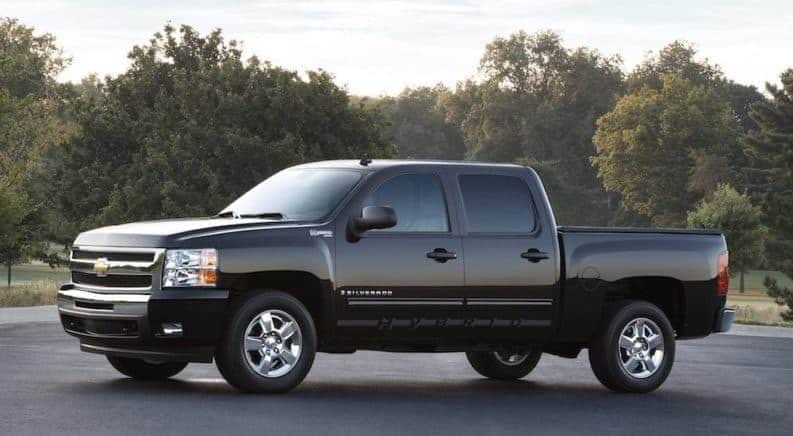Unless you’ve been living under a rock (or just taking a summertime snooze from the daily news), you’ve most likely heard the buzz that many countries are looking to ban gas-powered cars in the coming years. France and England are leading the charge – both are planning to stop the sale of gas-powered automobiles by 2040. In fact, Volvo is so dedicated to the mission that it has announced that by 2019 all of its cars will have either electric or hybrid motors. Clearly, the future is here and it is green.
While that’s all fine and good for snazzy little sedans and zippy compacts, it leaves us wondering – what about the vehicles that don’t seem exactly, well, environmentally friendly? You know what I’m talking about… I’m thinking of backroads, loaded down cargo beds, and rough and tumble rides. I’m talking about the good old all-American pickup trucks. Fun and ferocious to drive, what’s going to happen to the historically gas-guzzling pickup truck as the rest of the automotive world turns its back on the traditional gasoline-powered engine?
Will Pickups Become a Thing of the Past?
Interestingly enough, we might soon find out. It turns out that most major pickup manufacturers have a hybrid model coming to market relatively soon. Ford plans to release it’s F-150 model in hybrid form in 2020 and Chevrolet’s been testing the hybrid truck market since 2005 with its Silverado 1500 Hybrid, which has come in and out of production over the years. In fact, there are even a few hybrid Silverados and GMC Sierras on the market right now, but only in California and only in extremely small quantities. (According to this article, there were only 500 Chevy Silverado hybrids and 200 GMC Sierra eAssists released in that market).
As it turns out, the pressure should be on truck manufacturers to quickly make the switch to hybrid or electric. According to the BBC, “In Europe, less than 5% of vehicles are commercial vehicles or heavy duty trucks, but they contribute to almost 20% of greenhouse gas emissions,” says Ananth Srinivasan, mobility expert with research consultancy Frost & Sullivan. That’s a staggering ratio that should give truck manufacturers the incentive they need to start producing more environmentally-friendly vehicles – and perhaps more importantly, it should make buyers think twice before purchasing a less-than-eco-friendly option.
And while it’s certainly great news that traditional manufacturers such as Ford, Chevy, Nissan, and Ram are starting to think outside the gasoline-powered-box, perhaps even more compelling is the idea that a consumer-driven push to more sustainable trucks may give rise to entirely new manufacturers and brands.
All New Electric Vehicles, All New Electrifying Brands
Just take a look at a company called Bollinger Motors. Never heard of it ? Well, that’s probably because there is only one vehicle in its inventory: the B1.
What’s a B1? According to Bollinger, the “the B1 is the world’s first all-electric, all-wheel drive sport utility truck” and while it’s described as a “cross between a Jeep and an OG Hummer… you can remove the cab and doors for any job.” Basically, Bollinger Motors has managed to produce an electric vehicle that is both truck and SUV at the same time.
So sure, it’s got a pretty cool design backing it, and it’s neat that it’s all electric, but is it any good?
Well, if Bollinger is correct in stating that the B1’s 100 kWh battery can net a 200 mile range, then yeah, it’s going to be pretty hard to argue that the SUV/truck is anything but awesome.
Is there anything else worth noting about the Bollinger B1? Not much, aside from the fact that the workhorse can supposedly pump out 360 horses – which means this EV is going from 0-60 mph in under five seconds. Maxing out its speed at 127 mph and with an ability to haul a 6,100-pound payload, the B1 might just be the truck of the future. At the very least, it’s going to give those other manufacturers a run for their money.
Of course, the Bollinger B1 is still not being mass-produced and it has a long way to go before you’ll see them coasting en masse down the highway, but Bollinger has certainly shown that although a truck might be electric, it doesn’t make it any less of a beast. We might be moving towards being more gentle to the earth, but that doesn’t mean that our rides are going to be any less relenting on the roads.
In the Meantime…
So while you might have to wait a little while to reap the benefits of going green in a truck, you can rest assured that the day is coming where you’ll be able to feel just as environmentally friendly in a pickup as you would in Bolt or a Prius. However, until that time arrives, consider doing your part to reduce emissions by driving a pickup that’s fuel efficient, such as the 2017 Chevy Colorado in the two-wheel drive turbodiesel model, which gets 25 miles to the gallon combined (22 mpg in the city, 30 mpg on the highway). Of course, if you like those fuel numbers, but want something different than a Chevy, you’re in luck – the GMC Canyon matches the EPA fuel estimates exactly, if equipped with rear-wheel drive and the 2.8-liter Duramax turbodiesel engine.
Willing to compromise slightly on your fuel economy? You can scope out the 2017 Ford F-150, also in two-wheel drive. Opt for the F-150 and you’ll be getting 19 miles per gallon in the city and 26 mpg on the highway for a combined 22 mpg. Honda, Nissan, and Toyota have also all released trucks that offer some great fuel-economy… you’ll just have to balance your desire for a greener truck with your need for top-notch performance.
While there’s obviously no perfect substitute for an all-electric pickup truck, manufacturers are certainly doing their best to get the best fuel efficiency possible out of their trucks. The only question that remains is: will they be able to stay relevant once companies like Bollinger begin to capitalize on the new trend (and in some places, law) of going all-electric? We will only have to wait a few short years to find out.



